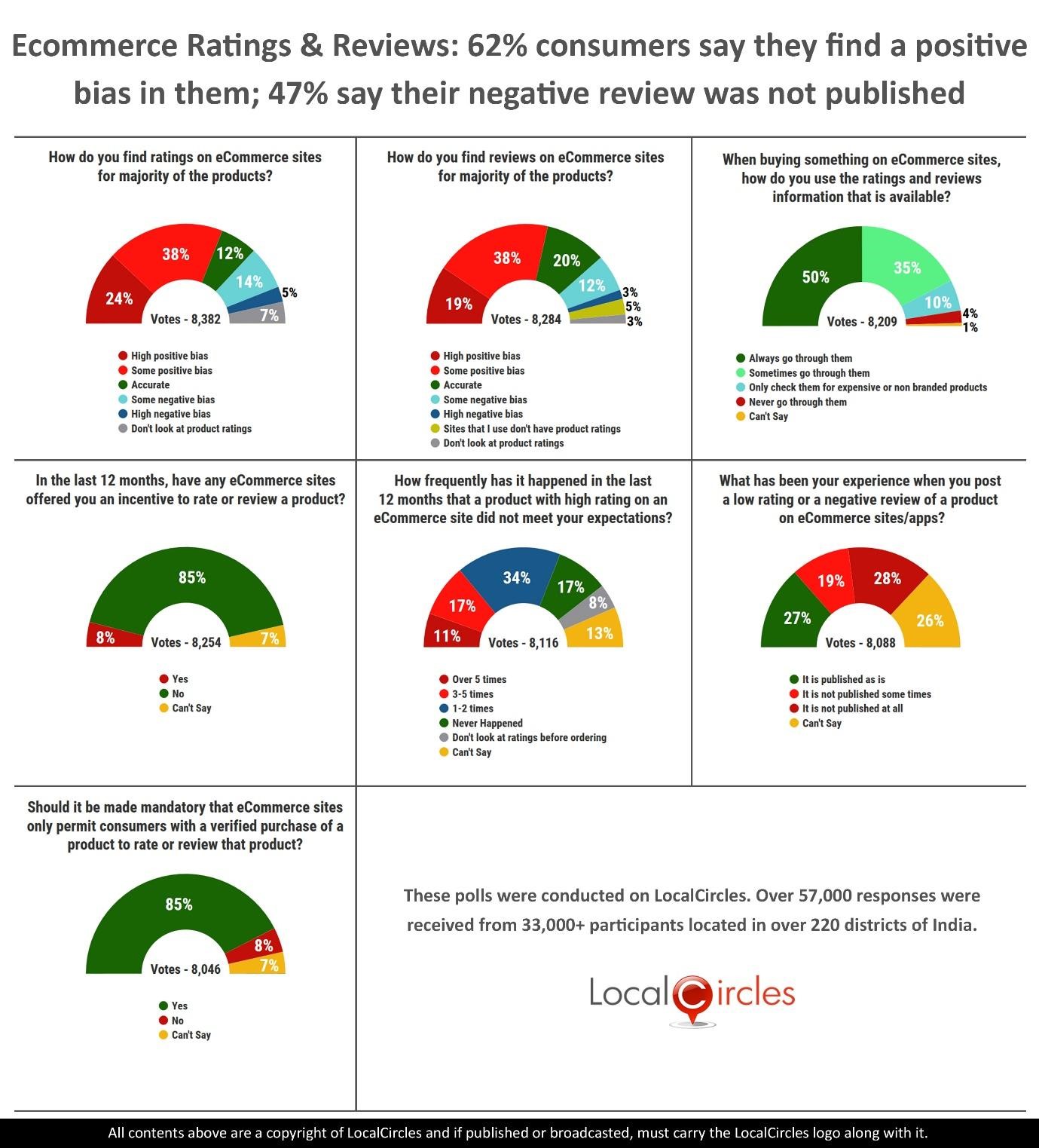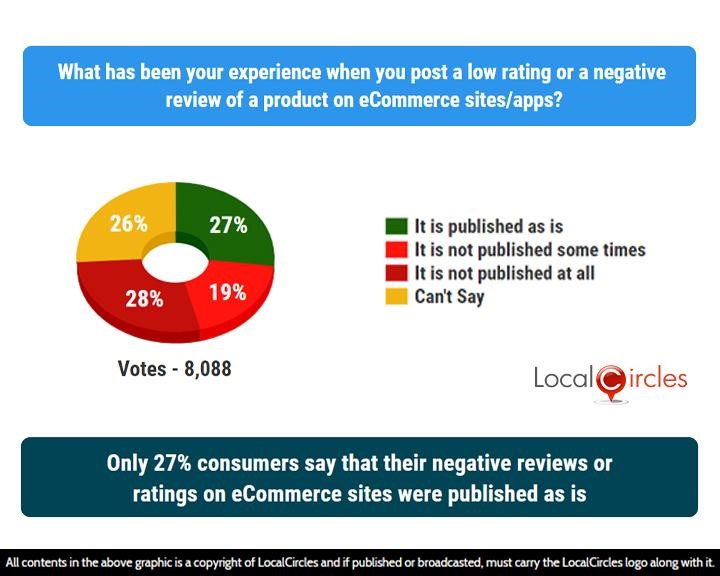Ecommerce Ratings & Reviews: 62% consumers say they find a positive bias in them; 47% say their negative review was not published
- • Majority consumers rely on product reviews & ratings for ecommerce purchases
- • 85% want ecommerce sites to only allow customers with verified purchase of a product to rate or review that product

9th October 2019, New Delhi: The LocalCircles’ pre-festive season Mood of the Consumer survey suggested that the despite consumers cutting back on discretionary spending in August and September will be back shopping in October. Initial reports by eCommerce majors Amazon and Flipkart indicate strong sales growth in the last 1 week. While the consumers are seeking discounts and making purchases and ecommerce platforms are seeking strong sales growth, cases of fake or counterfeit product continue to get reported.
Many consumers over the last 6 months and even this past one week have reported their continued reliance on rating and review information before buying something. To empower the consumer with information and to get the ecommerce platforms to make better information available to consumers, LocalCircles conducted a detailed survey on consumer experience with reviews and ratings on ecommerce sites. The survey received over 57,000 votes from 33,000+ unique participants across 220+ districts in India.
Reviews & ratings are a key component of the consumer buying process from an ecommerce site or app. Because the consumer is unable to physically experience a product while shopping on ecommerce, reviews & ratings become all the more important as it helps them see the product feedback from other consumers who have already purchased & used that product. The first question asked consumers how do they find ratings on ecommerce sites for majority of the products. 24% said they find high positive bias, 38% find some positive bias, 12% find it accurate, 14% find some negative bias and 5% said they find high negative bias.
62% consumers say that product ratings on eCommerce sites have a positive bias on majority of their products

Consumers by design tend to rate and review more when they have a negative experience and hence the survey finding is a bit contrary to this. However, if a seller gets related parties like family, friends or even hired marketing agencies to rate and review their product listing, they can boost the rating of the product. If you are a consumer shopping on ecommerce platforms, you must look at the number of ratings a product has received and not get carried away with a 5 star rated product which has just been rated by 2-3 users. It is also suggested that consumers observe the date of the rating. Many times, paid ratings happen within a short time frame like a week or month when the seller may have hired paid marketing services rather than over a longer period of time.
The next question asked consumers, how do they find reviews on ecommerce sites for majority of the products. 19% said they find high positive bias, 38% find some positive bias, 20% find it accurate, 12% find some negative bias and 3% said they find high negative bias. 5% said sites that they use don’t have product reviews. 3% said they do not look at product ratings.
Once again, positive reviews but just a few of them does not necessarily indicate a high quality product. Also, consumers must look for dates of the reviews. Positive reviews posted within a short period is a potential red flag.
57% consumers say that product reviews on eCommerce sites have a positive bias on the majority of the products

Many consumers have been complaining on LocalCircles that ecommerce sites do not publish a low rating or a negative review even for verified purchases and they received communication stating that their review could not be processed as it fails the review guidelines. When this question was asked, only 27% consumers said that their negative reviews or ratings on ecommerce sites were published as is. 19% said it is not published sometimes and 28% said it is not published at all. 26% were unsure about it.
The upcoming Ecommerce Guidelines by Department of Consumer Affairs identifies reviews & ratings as an important tool for the consumers to make a purchase and looks to put strong checks and balances for product reviews on ecommerce sites to protect consumer interest. It also strictly prohibits an e-commerce entity from indulging in falsely representing the customers or posting false reviews on their behalf. LocalCircles has also sought that unless a review is promotional, has abusive content or is inappropriate in a community setting, all reviews and ratings for verified purchases must be published as is.
Only 27% consumers say that their negative reviews or ratings on eCommerce sites were published as is

The next question consumers were asked was when buying something on ecommerce sites, how do they use ratings and reviews information that is available. 50% said they always go through them and 35% said they go through them sometimes. 10% said they only check them for expensive or non-branded products while 4% said they never go through them. This is a great insight for ecommerce platforms and also indicates to them the importance of ensuring the integrity of reviews at all times. Very clearly, the platforms that will provide trustworthy information on reviews and ratings will have a competitive advantage and consumer trust in the long run.
Majority consumers rely on product reviews and ratings on eCommerce sites before buying a product

Next question asked consumers how frequently has it happened in the last 12 months that a product with high rating on an ecommerce site did not meet your expectations. 11% said it happened over 5 times, 17% said it happened 3-5 times, 34% it happened 1-2 times and 17% said it never happened to them. 8% said they do not look at ratings before ordering. 13% were unsure. This is indicative of the issue of positive bias outlined in the first two polls. If the negative reviews and ratings are not censored and if the seller influenced reviews and ratings are minimised, it will address this area of customer dissatisfaction.
62% consumers had one or more product they ordered based on high rating on eCommerce sites, not meeting their expectations

In the next question, 85% consumers explicitly said they want ecommerce platforms to only allow customers with verified purchase of a product to rate or review that product. Only 8% voted against it. This is something that some of the major platforms follow but a large number of sites do not. LocalCircles has suggested to the Government on ecommerce consumer protection guidelines to only allow ratings and reviews by users who have made a verified purchase on that site. While this will address a good bit of the problem, it will still not address the seller influenced reviews who would go to the extent of making a verified purchase through family, friends or external agencies to get a positive rating and review.
85% consumers want that eCommerce sites only allow customers with verified purchase to review and rate a product

While the sellers may be influencing reviews and ratings and ecommerce platforms may be censoring negative ratings and reviews, one thing that the platforms seem to be doing right is not pay the user or provide an incentive to rate and review products. When consumers were asked in the final question, 85% consumers said that in the last 12 months ecommerce sites did not offer them any incentive to rate or review a product. Only 8% said it did happen. This becomes important to ensure that the process of reviews & ratings is not misused and stays a credible source of information for consumers
85% consumers say eCommerce sites didn’t offer them any incentive to rate or review a product

If you are a consumer shopping on ecommerce sites, do keep the following in mind:
- • Along with the rating of the product, number of users who have rated it. Few users rating a product 5 star may not mean much
- • If the high ratings and reviews of a particular product are within a short period of time. This may indicate possibility of seller influenced reviews
- • Rating and Reviews of the seller themselves
- • Always sort for recent reviews as the product quality may have changed. The default option generally is top reviews
LocalCircles has received a lot of consumers inputs on ecommerce reviews & ratings which have been submitted to DPIIT and Department of Consumer Affairs for inclusion in the upcoming ecommerce policy and ecommerce guidelines. Among others, the important ones include all ratings for verified purchases furnished by the consumer to be displayed on the ecommerce website with the only exception of inappropriate language or promotional reviews, and requiring ecommerce platforms to device a mechanism to prevent fraudulent reviews & ratings by sellers and their affiliates by tracking user IDs, IP addresses etc.
Consumers rely on ecommerce reviews & ratings a lot as it helps them get useful information about the products and is also the only way for them to know if the product is a fake/duplicate. Most of the ecommerce sites also have algorithms in place which give display priority to seller products which have better consumer ratings. Those ecommerce platforms who are able to effectively build a high integrity and trustworthy review and ratings information database will clearly have a distinct competitive advantage.
About LocalCircles
LocalCircles takes Social Media to the next level and makes it about Communities, Governance and Utility. It enables citizens to connect with communities for most aspects of urban daily life like Neighborhood, Constituency, City, Government, Causes, Interests and Needs, seek information/assistance when needed, come together for various initiatives and improve their urban daily life. LocalCircles is free for citizens and always will be!
Akshay Gupta - media@localcircles.com, +91-8585909866
All content in this report is a copyright of LocalCircles. Any reproduction or redistribution of the graphics or the data therein requires the LocalCircles logo to be carried along with it. In case any violation is observed LocalCircles reserves the right to take legal action.


